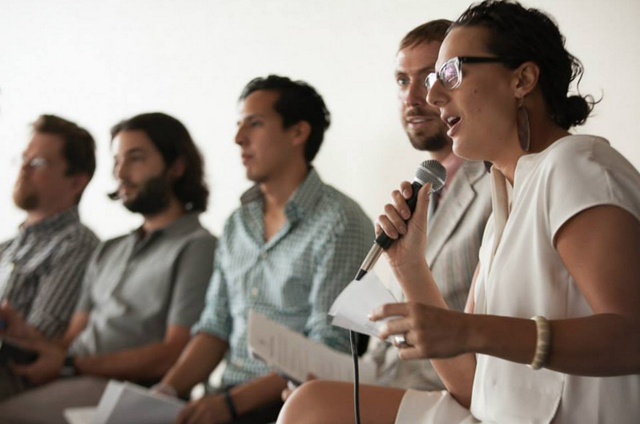
Miami summit promotes social change with local action
Above: A Social Good Summit Miami panel on “Design: A Tool for Change” brought local leaders in entrepreneurship together to rethink engagement and social entrepreneurship. Credit: Jayme Gershen Miami’s biggest challenge may be its obsession with examining its biggest challenges, according to city leaders.
The second annual Social Good Summit Miami assembled influencers at the Miami Innovation Center to discuss ways of taking local action while thinking globally. The collision of voices across the city — in philanthropy, sustainability, art, technology, education, city services and local government — identified what assets need to be leveraged today to make Miami a world-class city tomorrow.
Since 2010, innovators worldwide have live-streamed +SocialGood conversations as an extension of Mashable’shyperlocal campaign to solve the world’s challenges by 2030.
Summit organizer Michelle Dow, owner and founder of Social Swag Co., said that the summit held in late September and co-sponsored by Knight Foundation, originally came to Miami as a result of civic and community engagement research that ranked Miami as the least-engaged city in the United States. Panelists across all sectors, however, suggested that the statistics of yesterday don’t apply to the city’s current synergy and that the elements for success already exist.
“It’s convoluted to compare Miami to other cities in the U.S.,” Dow said. “Miami’s engagement is unlike the rest of the United States. Our need now is to engage the public in conversations like Social Good Miami so that we can showcase what’s right in our community engagement and seed growth around that.”
A discussion titled “Act Local. Think Global” featured individuals making investments in city leaders with global potential. Rather than see the city as a place that suffers from transience or “brain drain,” several panelists suggested that the term “brain gain” may be more accurate.
“Brain gain is exactly what we see and we’re seeing examples in many ways,” said Matt Haggman, Miami program director for Knight Foundation. “One example is that Miami has been named top five when it come to post-recession cities that are attracting young, college-educated talent.”
A panel of Ashoka Fellows — all high school students in Miami-Dade County — said that when it comes to talent retention, the ideas that they have been encouraged to grow in the community will make them long-term residents.
“Sure, we can talk about math and science,” said Owen Zighelboim, co-founder of Study Buddies, a startup that offers intensive SAT prep resources to lower-income students. “But what really matters is what’s actually happening outside. There are so many students out there who have never heard about social entrepreneurship and haven’t been pushed to get involved.”
In the meantime, other Ashoka Fellow panelists agreed that it’s important for young people to continue to ask questions and never take no for an answer.
Fellow Valeria Hansen, 16, sits on more than 15 local and national boards. As an adviser to the U.S. Department of Education’s GEAR UP initiative who has pushed agendas to state legislatures, she believes there are no boundaries to the influence of today’s youth in promoting social good.
“We’re in an age of unprecedented connectivity,” said Hansen, president of South Florida Girl Up. “We have the opportunity to break the glass ceiling, to connect, share, and repeat.”
Leaders in education also demanded a paradigm shift take place in traditional teaching. Willis Goldbeck, founder of Foresight Education, an applied learning curriculum for youth, said creativity should be a priority in the classroom.
“Our biggest challenge in education today is that teachers can’t tolerate the subject of wonder; they only understand the subject of solutions,” he said. “In the education of the future there will be no study of economics without the study of environment and to say it’s one or the other is a misunderstanding of both.”
Entrepreneurs across all initiatives at the summit helped to rethink how Miami can both use physical spaces to inspire natural collisions and empower citizens with low-barrier points of entry in the discussion of problems and solutions.
Some panelists also emphasized a need to see the value in both art and design. According to Hugh MacLeod, creative director of Gapingvoid, the key to fostering growth in Miami is that the city begin to identify itself as a city of artists and makers.
“People come to Miami to consume,” MacLeod said. “This isn’t considered a place where people make art and we as a city have to begin to see ourselves as producers, not consumers.”
Jenna Buehler is a Miami-based freelance writer.